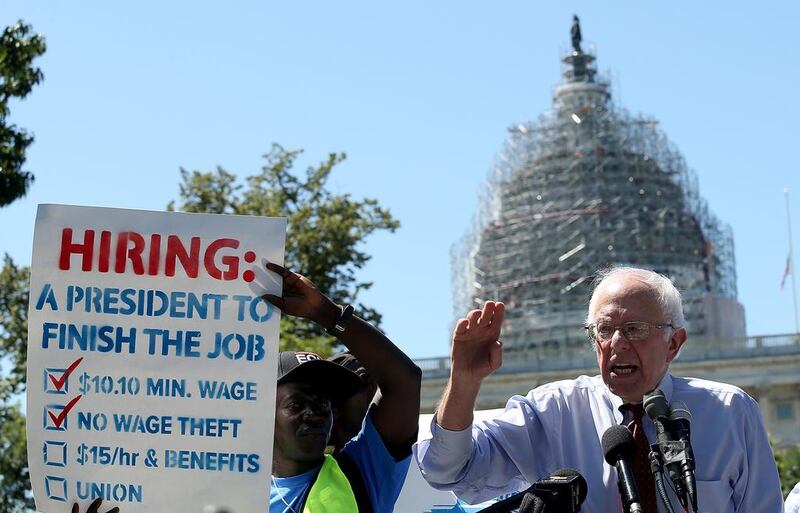On January 20, 2009, I sat alone in the staffroom of the secondary school where I worked in the UK. I watched, from 3,000 miles away, as the United States swore in its first African-American president.
As my country made history, I could feel a shift in the ether. The nation had entered a new phase, one that gave millions hope for a brighter future – and a chance to rectify the damage done through overseas wars and the financial crash.
Fast-forward nearly eight years and I am now more than 6,000 miles away, watching from the UAE as my country sits on the edge of an implosion. We are, both government and people, at a breaking point. The past two presidential terms have witnessed a growing and divisive partisanship – one that has felt like an endless tug-of-war game where few have won.
America and its politics are more polarised than at any point in the past two decades, according to a 2014 Pew Research Center poll. Yet little seems to compare to the unbridled discontent and divisiveness that, over the course of this year’s election campaigns, seems to have seeped into the very fabric of our nation.
Of course you don’t need statistics to understand just how volatile things have become. One needs simply to log onto Twitter or Facebook, watch the news, or take a look at the “comments section” under most political op-eds for a glimpse of the chaos. Before my eyes, we are shedding our self-image as a nation founded on religious tolerance and one which has welcomed immigrants from across the world, to become one characterised by dogmatism, fear and isolationism.
Watching everything play out, with a constant sense of dread, does make me wonder whether I’ve simply become too cynical. Perhaps something about living abroad has removed the rose-tinted glasses of patriotism and has, instead, left me seeing everything in shades of grey.
My mother tried to reassure me during a recent phone call one evening that it’s not really as bad as it seems. I’m not sold. Even taking into consideration how far (physically) removed I am from the election, these past few months have sparked in me a new kind of embarrassment – one that far exceeds what I felt during the (second) George Bush era.
I am ashamed when asked questions like “What is happening to your country?” as those elected to lead us refuse to come together to find a solution following yet another mass shooting. I can feel my stomach churn as I watch politician after politician take to social media to sling schoolyard insults at opponents, as though this is acceptable behaviour. I fear for the safety of friends and my cousin’s two little boys when I see yet another black man gunned down in daylight by those sworn to protect them. I am equally angry when our officials respond to these all too often occurrences with #AllLivesMatter, a display of their refusal to acknowledge the systematic racism that still plagues the US.
And I am at a loss for what to say to friends and colleagues when the presumptive Republican presidential nominee Donald Trump proposes to ban them from entering the US.
And it isn’t as if my embarrassment is reserved for one side of the political aisle. I watch as the Democratic Party, which I support, tears itself apart through infighting and lies. Friends vent their frustration at politicians of the party who say they’re “for the people”, while they wilfully continue to neglect marginalised groups.
Additionally, policies such as the student loan forgiveness plan give the illusion of being progressive, but will mainly benefit a small number of privileged Americans.
As for an unwritten expectation that I will vote for a candidate simply because we share the same gonosome, I’ll be the first to admit that I’d be over the moon to see a woman finally elected into office, when Hillary Clinton formally gets the nomination, but I'm still not convinced of both her values and ability to lead effectively.
Yet out of the hate and fractured alliances has sprung a new wave of political and social movements, and with it, a sense that all is not lost. The campaign of Bernie Sanders – who endorsed Clinton on Tuesday – alone was testament to the fact that the American people are not happy with the current political system, nor with the type of candidates we see year after year.
We witnessed 3,000 activists gather in Chicago in June for The People’s Summit, a three-day event that aimed to build a movement to transform the nation and the planet. Topics included mass incarceration and criminal justice reform, climate change, immigration policy, the fight for free higher education, and achieving Constitutional pay equity for women. And even the Green Party and its presumptive nominee Jill Stein have gained momentum as a potential alternative to the status quo.
As the country readies itself for the 2016 Republican National Convention on Monday, there has never been a better time to take a step back and reflect. We need to take a good, hard look at what we have become. Is this the political – and social – trajectory we want to continue down, or are we ready to put petty differences aside and work together for the greater good of our nation?
I’d like to think, to some extent, the American people will choose the latter. Perhaps, despite my cynicism, there’s still a part of me that wants to see my country in spectacular colour once more.
Ashley Lane is assistant features editor of magazines at The National.





